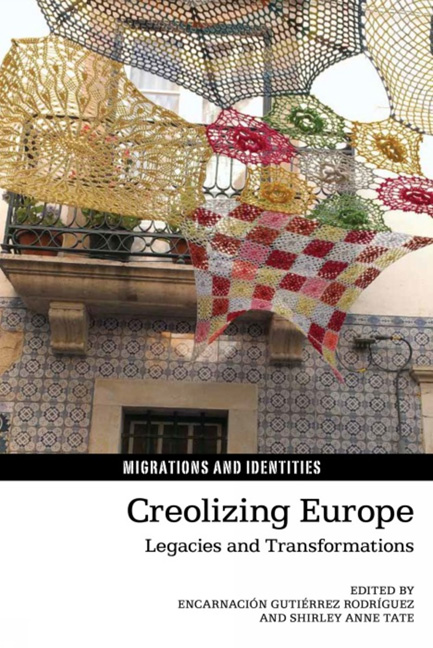Book contents
- Frontmatter
- Dedication
- Acknowledgements
- Contents
- List of Figures
- List of Contributors
- Introduction: Creolizing Europe: Legacies and Transformations
- 1 Creolité and the Process of Creolization
- 2 World Systems and the Creole, Rethought
- 3 Creolization and Resistance
- 4 Continental Creolization: French Exclusion through a Glissantian Prism
- 5 Archipelago Europe: On Creolizing Conviviality
- 6 Are We All Creoles? ‘Sable-Saffron’ Venus, Rachel Christie and Aesthetic Creolization
- 7 Re-imagining Manchester as a Queer and Haptic Brown Atlantic Space
- 8 Queering Diaspora Space, Creolizing Counter-Publics: On British South Asian Gay and Bisexual Men's Negotiations of Sexuality, Intimacy and Marriage
- 9 On Being Portuguese: Luso-tropicalism, Migrations and the Politics of Citizenship
- 10 Comics, Dolls and the Disavowal of Racism: Learning from Mexican Mestizaje
- 11 Creolizing Citizenship? Migrant Women from Turkey as Subjects of Agency
- Index
1 - Creolité and the Process of Creolization
- Frontmatter
- Dedication
- Acknowledgements
- Contents
- List of Figures
- List of Contributors
- Introduction: Creolizing Europe: Legacies and Transformations
- 1 Creolité and the Process of Creolization
- 2 World Systems and the Creole, Rethought
- 3 Creolization and Resistance
- 4 Continental Creolization: French Exclusion through a Glissantian Prism
- 5 Archipelago Europe: On Creolizing Conviviality
- 6 Are We All Creoles? ‘Sable-Saffron’ Venus, Rachel Christie and Aesthetic Creolization
- 7 Re-imagining Manchester as a Queer and Haptic Brown Atlantic Space
- 8 Queering Diaspora Space, Creolizing Counter-Publics: On British South Asian Gay and Bisexual Men's Negotiations of Sexuality, Intimacy and Marriage
- 9 On Being Portuguese: Luso-tropicalism, Migrations and the Politics of Citizenship
- 10 Comics, Dolls and the Disavowal of Racism: Learning from Mexican Mestizaje
- 11 Creolizing Citizenship? Migrant Women from Turkey as Subjects of Agency
- Index
Summary
I begin with two apologies. First, for the schematic nature of my presentation. I am trying to map together a different number of areas in order to pose some basic questions about the process of creolization. This inevitably means that I cannot go into the complexity and detail which each of them deserves. Second, an apology for obliging Derek Walcott to listen to yet another exercise in ‘cultural theory’, which I know he thinks is a tremendous waste of time.
I want to think about the passage from Édouard Glissant quoted in the notes prepared by the Documenta 11 team for this Platform, to the effect that ‘the whole world is becoming creolized’. What can such a statement mean, and what are its conceptual implications? I explore these questions in the context of the themes proposed in the notes: ‘Can the concept of créolité be applied to describe each process of cultural mixing, or is it peculiar to the French Caribbean? Does it constitute a genuine alternative to the entrenched paradigms that have dominated the study of postcolonial and postimperial identities?’ Do ‘créolité ’ and ‘creolization’ refer to the same phenomenon, or does ‘creolization’ offer us a more general model or framework for cultural intermixing? Should ‘creolization’ replace such terms as hybridity, métissage, syncretism? In short, what is its general conceptual applicability?
Obviously, Glissant's remark that the whole world is becoming creolized is a metaphorical, or better, a metonymical, statement. That is so to say, it depends on the extension or expansion of a specific concept to other historical situations, other historical moments, other kinds of society, other cultural configurations. This can be a dangerous exercise, because it means mapping a concept across a number of conceptual frontiers; and the question is, at the end of this process, what relationship does the expanded concept have to the original? Has it moved so far as to have destroyed all the richness and specificity present in its first, more concrete, application? This is certainly the critique of ‘creolization’ offered today by some Caribbean scholars, who say that its ubiquitous application has eroded its strategic conceptual value.
- Type
- Chapter
- Information
- Creolizing EuropeLegacies and Transformations, pp. 12 - 25Publisher: Liverpool University PressPrint publication year: 2015

